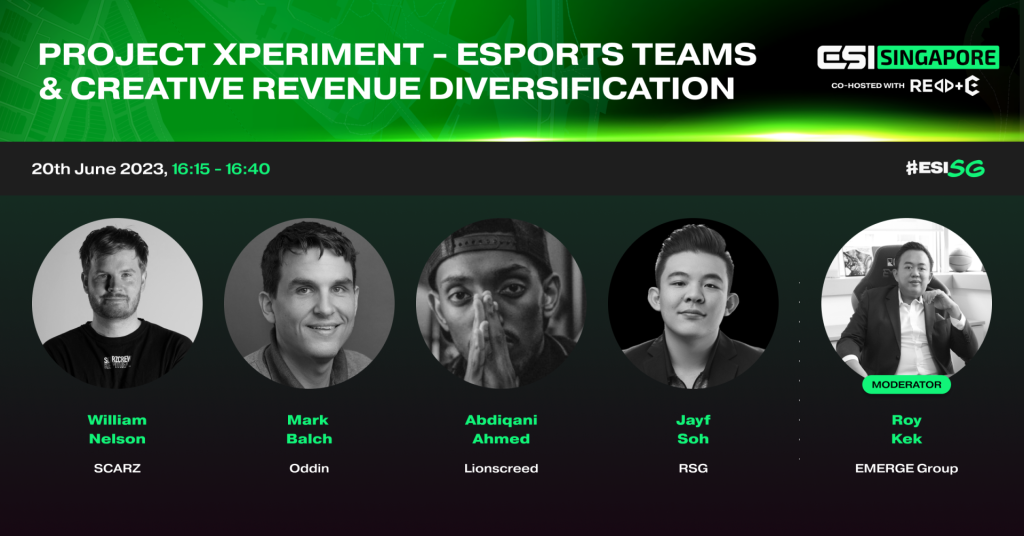Ahead of Esports Insider’s latest industry conference, ESI Singapore (20-21st June), we delve into the context behind an upcoming panel on esports revenue diversification.

It’s no secret in the industry that esports is going through a period of consolidation and diversification.
Esports winter’s cold chill has led to many organisations having to rethink their strategic plans. Simply put, being a competitive powerhouse alone across the esports landscape is not viable for every team.
With sponsorship revenue on shakier ground, it’s crunch time for esports organisations to diversify their revenue opportunities. Over the last 12 months, we’ve seen organisations delve into ambitious projects — music labels, media companies and game development studios, to name a few — all with the ultimate goal of creating distinct revenues that aren’t directly tied to the competitive success of the organisation.
There are multiple factors that have led to organisations looking to branch out their revenue streams. However, perhaps most pressing is the teams’ inability to generate sustainable revenue through competitions alone. The dream of media rights revenue, which is a major source of income within some major traditional sports, continues to face reluctance from fans and doubts of success from prominent industry stakeholders.

Interested in this topic? On June 20th-21st ESI Singapore will be delivering an engaging panel featuring major industry stakeholders on this very subject! Secure your tickets now.
Discover the future of esports, uncovered, as we deliver unmatched networking on the Singapore River, enriching industry discussions, delicious F&B and a fun evening reception!
John Needham, President of Esports at Riot Games, stated in a blog post: “Linear television is not, and has never been, a good channel for esports content because there is a fundamental audience mismatch. Most of Riot’s audience isn’t watching ESPN and FOX Sports; they’re watching streamers on Twitch and YouTube.”
Esports fans have been brought up on the idea of free entertainment since the industry’s inception. So fears of putting competitions exclusively on one platform or behind a paywall could lead to decreased viewership and reduced interest in the esport.
Needham continued: “A few years ago, streaming platforms in the West did sign big, exclusive license deals for other non-Riot esports as part of bigger infrastructure deals with their parent companies. Ultimately, these deals didn’t earn out.”
Given the economic condition and its effect on sponsorship and investment opportunities, the inherent lack of major income to sustain expensive competitive operations isn’t there for most scenes. Revenue sharing and partner programmes offer something of a counter to this, but still have as yet failed to combat increased operation costs and player wages.
The esports scene, from a financial standpoint, isn’t as hyped in the Western world as it was during the pandemic, when there was a rise in interest from consumers and investors. However, diversification shouldn’t be seen as a negative solution; in fact creating more revenue opportunities, no matter the health of esports, is a smart business move.
The balancing act comes in ensuring that these new ventures don’t subtract from the identity and origins that created the esports organisations in the first place. One avenue that has a clear through line is the creator economy, given the gaming link that ties creators and esports.
Globally, this method of diversification has become more and more popular. Misfits Gaming launched a $20m creator fund last year and has heavily invested in the Roblox creator space. Meanwhile, North American esports company GameSquare Esports has launched a creator marketing platform.
Going one step further, Southeast Asian esports and gaming company Tier One Entertainment launched ALLIANCE last year, an incubator programme created to curate personalities in the Web3 space.
Finding ways to monetise loyal fanbases has also risen in prominence over the last couple of years. Team Liquid, Sentinels, Cloud9 and many more have launched fan-focused platforms that aim to provide more engaging experiences, at a cost.
What is crucial to understand though is that creating new revenue opportunities isn’t an entirely new phenomenon. Merchandising and apparel, for example lifestyle merch, has always been an avenue that esports organisations have utilised. However, the need to create new divisions and projects outside of esports has become a higher priority.
To delve further into how the Eastern world is dealing with esports’ new diversification decisions, two notable organisations — mobile powerhouse RSG and prominent Japanese team SCARZ — will be on a panel at ESI Singapore (commencing June 20th-21st). Alongside them providing a Western perspective, will be UK esports organisation Lionscreed, which this year has seen the creation of the Lions Clash student tournament series and is embracing a creator-focused approach too.
Discussing new business opportunities is paramount, particularly if esports organisations are looking to bolster operations in specific regions. Every region has its own niche and structure, as a result, its revenue opportunities will differ.





